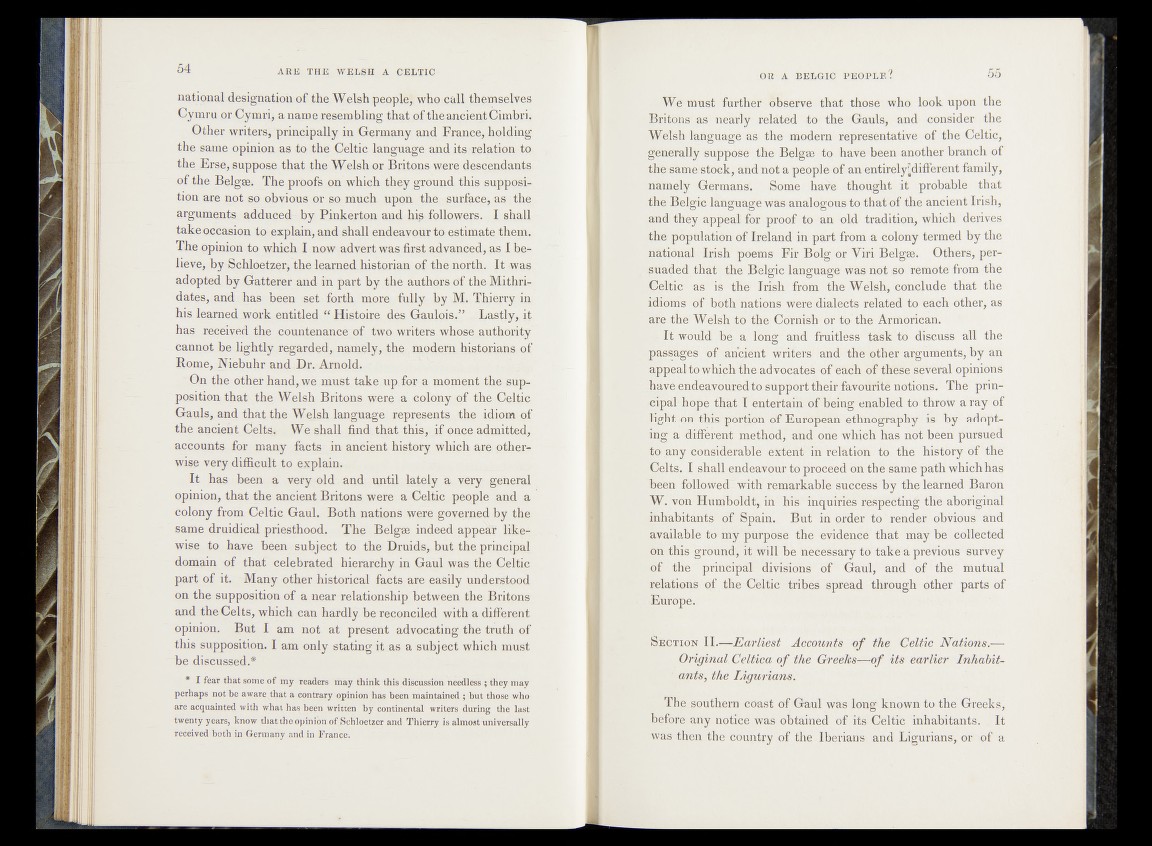
national designafioh o f the Welsh people! who call themself es
Gymru or Cymri, a name resembling that of the ancient Gimbri,
Other writersj principally in Germany and France,, hoi ding
the same opinion as to the Celtic language and its -relation to
theJErse, suppose that the W elsh or Britons were descendant8
of the Beiges. The proofs on which they ground this suppogb
tion are not so obvious or so much upon the surface, as the
arguments adduced by Pinkerton and hip followers. I shall
take occasion to explain, and shall endeavour to estimate them.
The opinion to which 1 now advert was first advanced, as I believe,
by Schloetzer, the learned.histo.rian of the north. I t was
adopted by Gatterer and in part by the authors Of the Mithri-
dates, and has been set forth morp„, fully by M. Thierry iju.
his iearnedjwork entitled “ Histoire des Gaulois.” it
has received the countenance^of two writers whos4 authority
cannot be lightly regarded, namely, the . modern historians of
Home, Niebuhr and Dr. Arnold.
On the other hand, we must take,up.for a moment the-sup-
position that the Welsh Britons were a colony of the .Celtfo
Gauls, and that the Wejsh language represents the idiom of
the ancient Celts. We shall find that this, if once admitted,
accounts for many facts in ancient history which are other*
wise very difficult to explain.
It has been a very old and until lately a very general
opinion, that the ancient Britons were a Celtic people and a
colony from Celtic Gaul. Both nations were governed by the
same druidieal priesthood. The Belgae indeed appedr likewise
to have been subject to the Druids, but the principal
domain o f that celebrated hierarchy in Gaul w:as the Celtic
part of it. Many other historical facts are easily understood
on the supposition of a near relationship between the Britons
and theCelts, which can hardly be reconciled with a different
opinion. But I am not at present advocating the truth of
this supposition. I am only stating it as a subject which must
be «discussed.*
* I fear that some o f my readers may think this discussion needless ; they may
perhaps not'be awarethat a contrary opinion has been maintained ; hut those who
are acquainted with what has been written by continental writers during the. last
twentyyears, know thattheopinion of jSyhloet?cr and Thierry is almost universally
received both in Germany and in France.
We? must further observe that those who look upon the
Brito£afi?as‘’nea;dy related to the Gauls, and consider the
Wetspfiafigfiage as the modern representative of the Celtic,
generally suppose^ the Belgae* tc^ have been another branch of
thh same stock, and not a people hf^ah'èntirelyjjdifferent family,
namely • Germans, haVe thought it probable that
thé Belgic-laaguage was anal^oupffothatof the ancient Irish,
and they appeal for‘/proiM^fo an, old'- tradition, which derive#'
the population of Ireland in part from a colony termed by the
national Irish poems Fir Bolg or Viri Belgm. Others, perV
leaded that the Belgic febg-ji^hwas not so remote from the
as hè’ the Irish ’from'the Welsh, conclude that thé*
idiom# pf biih'natjpps« were dial®tg^e1ated to ’éach other, as
are thé Wplshjft) the Cornish or to" the Aymorican.
: It wnmi/Be a long ' ancT frm'tïeès^iasl|^fo d|sp^f|aTI th is
|||sSages of ancj'eht wrifers^’and/the* ©tlier arguments^tiy an
jjatöpeal tb which- the advocates, of each, o f tnftse several opmions
h a ^ ennmvbured to support their favod^tepèlËöns.' The pri'n-
« b ^ ^ ó p e that I entertain of enabled to'throw a ray-of
fight on this portion of European ethnographyfis by adopt-
in^tla rdi^éfe|it‘: mpthpf§| and one wliicK' Mas. riotybeen pursued
to*any considerable eitfen# inweMtion*to the históry o f the',
;Celts. I shalLendeavour tp proceed on the same path which has
been followed-with remarkable sucdeèiqby the learned Baron
W. von Humboldt, in his inquiries 'résp^^üg|ffie aboriginal
inhabitants of Spain._ But in order1’ to render obvious aiid
available to my purpose the evidence that may be ipcmeeted
on this ground, it will be necessary to take it previous survey
of the principal - divisions' .bf Gaul, and of the * mutual1
relations qf the Celtic tribes spread through; other parts of
•Europe.
S e c t io n II.—Earliest Accounts o f the Celtic}. Nations.-—
Original Celtica o f the Greehs^of its earlier Inhabit-
‘ ants, the Ligurians.
The .southern coast of Gaul was long known to the Greeks,
before any notice was obtained1 of its-Celtic inhabitants. It
was then the country of the Iberians and Ligurians, or of a